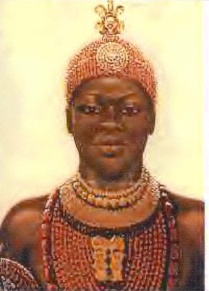Creation according to to the Yoruba belief
In the beginning of time the earth was a desolate marsh, a watery waste.
One day, Olorun, (the owner of the Sky and the Supreme Being), called the chief of the divinities, Orisha Nla, (the great god) and asked him to go down with a snail shell, full of sands, in order to create firm, solid ground on the earth below. Orisha Nla took with him a pigeon, and a hen with five toes as Olorun commanded him.
The great god Orisha Nla, slid down to the marshy waste and tossed the sands from the shell onto a small section of the watery earth. Then he set the pigeon and the hen down on top of the sands, where they began to scratch and scratch.
Soon they had spread the sands over a large portion of the marsh and had created solid ground. Later, Olorun sent Chameleon to inspect the earth and see if it was really solid and true. Slowly and carefully,
Chameleon descended and slowly walked over the solid ground and rolled his eyes around, taking in everything.
His colour slowly changed from blue of the sky to the brown of the soil. Then he reported to Olorun, that earth
was wide, but it was not dry enough.
Olorun sent him once again to see if the land was both wide and dry. Chameleon descended and walked over the
land a second time, and returned to report this time, that the land was both wide and dry.
Olorun named the land IfÈ, which means ìwideî and later added the word IlÈ, which means house.
This would be the house from which all other houses would originate.
The city of IlÈ-IfÈ, became the sacred city of the Yoruba, and still stands today.
It took four days to create the earth, and on the fifth day, the Great God was to be worshiped as the creator, but Olorun had not finished, and calling again on Orisha Nla, he told him, to plant trees for the humans for their nourishment and to give them wealth. He gave Orisha Nla a palm nut that would provide the humans with oil and juice for drinking, and other seeds for three more trees. When the Orisha Nla had finished planting, rain fell
and the trees flourished.
Then Olorun asked Orisha Nla to mold figures from the earth and bring them to me so that he might life into them.
Orisha Nla did as he was told, but he was jealous of the life-giving powers that Olorun alone
could bestow on the mud figures.
In the night, Orisha Nla decided to hide behind the figures and discover how Olorun brings them to life, but Olorun
knew everything, and all the thought of Orisha Nla, so he sent him into a deep sleep. When Orisha Nla, finally awoke from his deep slumber, Olorun had already given life to the humans.
To this day, Orisha Nla, still makes only the bodies and heads of humans, but he cannot give life to them, and he sometimes leaves marks on their bodies to show how unhappy he is.
The End
Yoruba Proverbs:
- A farmer that spread his coacoa in the sun to dry, will have to dry with them, (If he doesn't
want the goat to eat them.
- We don't enter into the water and start to be afraid of the cold (It has to be before)
- It the rope is not stabble it is useless for the hen to jump on to it (Both will fall)

